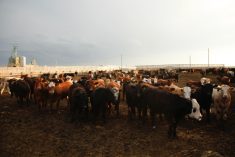Ottawa | Reuters — Canada will invest $252 million to help some of the country’s farming and food processing sectors weather the coronavirus outbreak, Prime Minister Justin Trudeau said Tuesday, adding more money could come later if needed.
The Canadian Federation of Agriculture, one of Canada’s biggest farm groups, asked Ottawa last week for an initial $2.6 billion in emergency funding to help the farming and food sector cover losses and additional costs caused by the pandemic.
Read Also

U.S. grains: Wheat futures rise on supply snags in top-exporter Russia
U.S. wheat futures closed higher on Thursday on concerns over the limited availability of supplies for export in Russia, analysts said.
Agriculture is considered an essential industry in Canada, where officials have shut non-essential businesses and have urged people to stay at home since mid-March.
The prime minister has repeatedly said Ottawa is focused on maintaining Canada’s food supply chain.
“This is an initial investment and if we need to add more, we will,” Trudeau said.
Canada’s total coronavirus death toll edged up by less than four per cent to 3,915 on Tuesday from 3,766 on Monday, according to official data, in a sign the outbreak has peaked. Only once in the last 16 days has the toll jumped by more than 10 per cent in a day and medical officials say the curve is clearly flattening.
Several food processing plants, primarily in the meat industry, have had to temporarily shut down or cut shifts after workers became infected with COVID-19, the illness caused by the novel coronavirus.
Trudeau said beef and pork producers, who have been forced to keep livestock on farms longer because of processing shutdowns, will receive $125 million in AgriRecovery funding, a disaster relief program traditionally cost-shared between Ottawa and Canada’s 13 provinces and territories.
That funding is expected to go toward programs “to manage livestock backed up on farms, due to the temporary closure of food processing plants.” Such programs would include a cattle set-aside, as recently proposed by the Canadian Cattlemen’s Association and the federal opposition Conservatives.
Another $77 million will help food processors buy personal protective equipment for workers, adapt to new health protocols, and increase domestic processing capacity.
Ottawa will also launch a $50 million food surplus purchase program to buy large quantities of certain items such as potatoes and poultry, where overall demand has fallen dramatically because of restaurant and bar closures. The food will then be redistributed to organizations focused on food insecurity.
Trudeau also announced a $200 million extension to the Canadian Dairy Commission’s line of credit in support of programs to purchase and store surplus dairy products such as cheese and butter, in order to avoid dumping milk.
To boost the CDC’s borrowing limit, the government “will work with opposition parties to achieve the required legislative change,” Trudeau’s office said in a release later Tuesday.
Trudeau’s office also said Tuesday it will work with the provinces and territories to increase the allowable interim payments available through AgriStability to 75 per cent of a producer’s estimated final payment, from the current 50 per cent. Saskatchewan and Prince Edward Island have already done so for the 2020 program year.
The PMO also said it would work with the provinces and territories “to explore possibilities for expanding the AgriInsurance program to include labour shortages as an eligible risk for the horticulture sector.”
— Reporting for Reuters by Kelsey Johnson; additional reporting by David Ljunggren. Includes files from Glacier FarmMedia Network staff.














